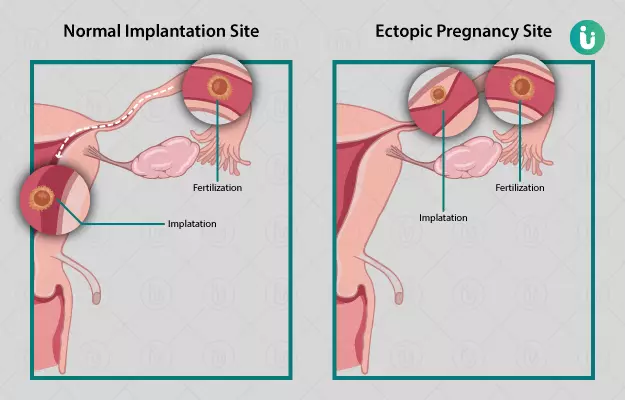In normal pregnancies, the fertilized egg attaches to the lining of the uterus after passing through the fallopian tube and the embryo develops inside the uterus. An ectopic pregnancy occurs when the fertilized egg attaches somewhere other than the uterus (mostly in the fallopian tube). For this reason, it is sometimes also called "tubal pregnancy". Ectopic pregnancies can also occur in your ovaries.
Ectopic pregnancies are very rare. It is found in 2 out of 100 women. But if it is not treated on time, it can be very dangerous. During an ectopic pregnancy, when the stretch in the fallopian tube increases, it breaks, this is called a ruptured ectopic pregnancy. This can lead to internal bleeding, infection and sometimes even death.
Read further in this article what are the symptoms of ectopic pregnancy, why it happens and what is its treatment. Also, information about getting pregnant again after ectopic pregnancy has also been given.
(Read more - Blocked Fallopian Tubes)
- Symptoms Of Ectopic Pregnancy
- Causes Of Ectopic Pregnancy
- Risk Factors Of Ectopic Pregnancy
- Diagnosis Of Ectopic Pregnancy
- Treatment Of Ectopic Pregnancy
- Normal Pregnancy After Ectopic Pregnancy
- Summary
Symptoms Of Ectopic Pregnancy
About 10% of women do not feel any symptoms in ectopic pregnancy. In many cases, its symptoms are similar to the symptoms of diseases like urinary system and gastrointestinal disorders such as appendicitis, salpingitis (inflammation of the fallopian tube), rupture of corpus luteum cyst, miscarriage, ovarian torsion or urinary tract infection. But to remove this misconception, definitely contact the doctor, he can advise you to get proper tests done. However, you experience the common symptoms of pregnancy only. You can use the following symptoms to help you identify a possible ectopic pregnancy:
- Blood collecting under the diaphragm due to a ruptured fallopian tube causes sharp, stabbing pain in the pelvis, abdomen, shoulder, and neck that comes and goes and varies in intensity each time.
- More or less vaginal bleeding than a normal menstrual period.
- Experiencing gastrointestinal symptoms.
- Feeling weak, faint, or dizzy
When Does An Ectopic Pregnancy Occur?
Medical diagnosis of an ectopic pregnancy usually occurs within a time frame of 4 to 8 weeks, with an average of 7.2 weeks after the last menstrual period.
(Read more - Bleeding During Pregnancy)
Causes Of Ectopic Pregnancy
An ectopic pregnancy can be caused by any of the following:
- Partial or complete blockage of the fallopian tube due to infection or inflammation.
- Scar tissue from a previous infection or surgery on the tube can also obstruct the movement of the egg.
- Previous surgery on the pelvic area or tubes can also cause the egg to stick to it.
- Abnormal growth and birth defects can cause abnormalities in the shape of the tube.
(Read more - How To Take Care During Pregnancy)
Risk Factors Of Ectopic Pregnancy
The cause of ectopic pregnancy cannot always be known, but if you have the following problems, then the chances of having an ectopic pregnancy increase:
- If you have sexually transmitted diseases, pelvic inflammatory disease (PID), endometriosis.
- If you have already suffered from ectopic pregnancy.
- If you have had pelvic or abdominal surgery.
- If you are 35 years of age or older at the time of pregnancy.
- If you smoke.
Pregnancy after infertility or using an intrauterine device (IUD) increases the chances of having an ectopic pregnancy. But this is very rare, as these types of birth control are more effective in preventing pregnancy.
Diagnosis Of Ectopic Pregnancy
Diagnosing an ectopic pregnancy can be a little difficult. Doctors may diagnose an ectopic pregnancy when you feel abdominal pain or find a clot or when you have a pelvic exam during your first prenatal visit.
If your doctor suspects an ectopic pregnancy, he or she may do a pelvic exam to check for pain, discomfort, or a clot in your fallopian tubes or ovaries. A physical exam alone is not enough to diagnose an ectopic pregnancy. However, the diagnosis is usually confirmed by blood tests and imaging, such as ultrasound.
During early pregnancy, the uterus and fallopian tubes are closer to the vagina than to the surface of the abdomen. A transvaginal ultrasound is performed, which involves performing an ultrasound test using a device placed in the vagina.
During an ultrasound, the sonographer takes a close look at the fallopian tubes and uterus. If your blood test shows that there are certain levels of the pregnancy hormone hCG but the sonographer cannot see an embryo in the uterus, it is likely an ectopic pregnancy. However, it is also possible that there has been a miscarriage or that there is a pregnancy in the uterus but it is still in the early stages.
It may be difficult to detect pregnancy through ultrasound at an early stage. If there is any doubt about the diagnosis, doctors recommend blood tests until an ultrasound confirms an ectopic pregnancy at four or five weeks.
In an emergency situation, if you are bleeding heavily, an ectopic pregnancy can be diagnosed and treated by surgery.
(Read more - Period-Like Pain During Pregnancy)
Treatment Of Ectopic Pregnancy
If an ectopic pregnancy is detected early, injections of the drug methotrexate are used to stop cell growth and destroy existing cells.
After the injection, your doctor will do a blood test to measure your levels of human chorionic gonadotropin (hCG), the pregnancy hormone. If the hCG level is high, you may receive another injection of methotrexate.
In other cases, ectopic pregnancies are usually treated with laparoscopic surgery. In this procedure, a small incision is made in the abdomen or near the navel. The doctor then examines the fallopian tube using a thin tube with a camera lens and light (laparoscope).
Other instruments may be inserted into the tube or through other small incisions to remove the ectopic tissue and repair the fallopian tube. If the fallopian tube is damaged, it may need to be removed.
If the ectopic pregnancy causes heavy bleeding or the fallopian tube ruptures, emergency surgery is needed through an incision in the abdomen (laparotomy). In some cases, the fallopian tube can be repaired. Usually, however, the ruptured tube must be removed.
The doctor will check your hCG levels after surgery to make sure all the ectopic tissue has been removed. If the hCG levels do not decrease, an injection of methotrexate may be necessary.
Normal Pregnancy After Ectopic Pregnancy
Women who have an ectopic pregnancy can have healthy pregnancies in the future. But this depends on the treatment methods and the condition of the fallopian tubes. If one of the two fallopian tubes is removed or the tubes are scarred, it may be more difficult to get pregnant. If your pregnancy is an ectopic pregnancy, you are more likely to have it again in the future.
The chances of having a successful pregnancy in the future are also quite good, and 65% of women have had a healthy pregnancy within 18 months after an ectopic pregnancy. Some studies have shown that this figure rises to about 85% within 2 years. The chances of getting pregnant depend a lot on the health of your tubes.
Read More - (7 days after a missed period)
Summary
An ectopic pregnancy is a condition in which the fetus develops outside the uterus, usually in the fallopian tubes, instead of in the uterus. This is an unusual and serious medical condition, as the fetus cannot fully develop outside the uterus. If medical intervention is not done in time, an ectopic pregnancy can be life-threatening for the pregnant woman, as it can cause the tube to rupture and cause internal bleeding. Its symptoms include severe abdominal pain, abnormal bleeding, and weakness. Treatment of an ectopic pregnancy may require the removal of the fetus with medications or surgery.










































